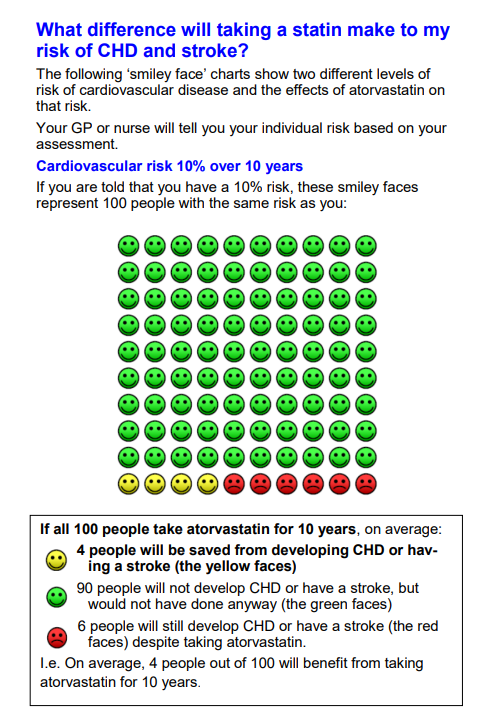QRISK and Statins
Why have I been sent this leaflet?
You are receiving this leaflet because you recently had a blood test to measure your cholesterol. As you may know, the amount of cholesterol in your blood can increase your risk of developing cardiovascular disease (CVD) which includes heart attack, stroke and peripheral vascular disease.
However, cholesterol is only one risk factor for CVD and using information from your medical record we can use the QRISK2 tool to calculate the likelihood of you having a stroke or heart attack in the next 10 years. The higher the score, the greater the risk. Also, the more risk factors you have, the greater your risk.
Other risk factors for CVD include:
- Age, gender, ethnicity
- High blood pressure, cholesterol level, body mass index (height and weight),
- Smoking, alcohol intake
- Medical conditions such as diabetes, rheumatoid arthritis, chronic kidney disease
- Strong family history of heart disease (in relatives under 60 years)
What does ‘risk’ mean?
Risk is the chance of something happening. It’s important to note that your risk of developing CVD is never zero and regardless of other risk factors, your risk naturally increases the older you get.
Your QRISK score will tell you whether you are at low, moderate or high risk of developing CVD in the next 10 years.
Low risk – QRISK2 score of less than 10%
This means that you have less than a one in ten chance of having a stroke or heart attack in the next 10 years.
Moderate risk – QRISK2 of 10-20%
This means that you have between a one to two in ten chance of having a stroke or heart attack in the next 10 years.
High risk – QRISK2 score of more than 20%
This means that you have at least a two in ten chance of having a stroke of heart attack in the next 10 years
What can I do to lower my risk?
New guidance from NICE (National Institute for Health and Care Excellence) suggests that anyone with a score of more than 10% (moderate risk) should be offered help to reduce their risk. This includes advice on making lifestyle changes and if this doesn’t work or risks above 10% we offer the option of starting medication to lower cholesterol (statins).
What lifestyle changes can I make?
You may have noticed that the list of risk factors includes things we can change (such as smoking status, weight and blood pressure) and things we cannot change (such as age and gender). We can therefore try to reduce our risk by taking a few simple steps including:
- Stop smoking – consider swapping to vaping initially which is considerably less risky.
- Eat a healthy balanced diet – low in fat, sugar and salt. Eat 5 fruit / veg a day.
- Reduce alcohol intake – aim for less than 14 units a week for men and women.
- Keep an eye on your weight and take steps to lose weight if needed. Aim for BMI 20-25.
- Exercise regularly (walking is a great start).
- Taking medication to reduce blood pressure if needed.
It is very likely that you will benefit from changes to your lifestyle (regardless of risk). However, we can test your cholesterol level again in 6-12 months, measure your weight, height and blood pressure and recalculate your QRISK2 score. If your score is the same, or has increased, then the GP or nurse can discuss whether you would benefit from taking a statin. Further information about how you can make lifestyle changes can be found on the NHS website for cholesterol or by visiting one of the sites listed below.
Statins explained
Statins are medicines that help lower your cholesterol and protect your arteries. This helps lower your risk of heart and circulatory conditions, such as:
- coronary heart disease
- angina (chest pain and discomfort)
- heart attack
- stroke.
Statins can help treat high cholesterol, but they are also a preventative medicine. This means they lower your cholesterol and help to prevent you from having heart problems in the future, like a heart attack.
Studies show that low-dose statins can lower your bad cholesterol (LDL) by up to 30 per cent and high-dose statins can lower it by more than 40 per cent.
What are statins used for
You may be given a statin if you’ve got:
- high cholesterol
- angina (chest pain and discomfort)
- peripheral arterial disease
- diabetes
- familial hypercholesterolaemia (FH).
Or you’ve had a heart attack, stroke, angioplasty and stent or coronary bypass surgery.
When deciding whether you should take a statin or not, your doctor will look at your overall risk of having a heart attack or stroke in the future.
Please see the NHS statins website or websites listed below for further information about statins. If you then wish to discuss the option of taking a statin then please make an appointment to speak to your nurse or GP.
